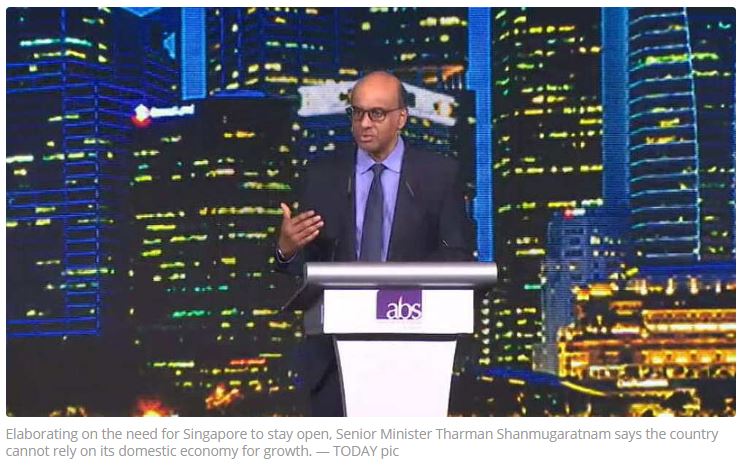Singapore must remain open to investments, foreigners to create opportunities for locals, says minister
SINGAPORE, Sept 15 — Singapore’s future rests on its role as a hub in sectors such as manufacturing, finance and logistics, Senior Minister Tharman Shanmugaratnam said yesterday, stressing that staying open is vital to maximising opportunities for Singaporeans.
Tharman also warned that the Covid-19 pandemic may lead to a “wipeout” of a significant number of small- and medium-sized enterprises (SMEs) as many of these companies have been battered by the crisis.
Tharman, who is also Coordinating Minister for Social Policies, was speaking during a dialogue at the Singapore Summit, an annual forum bringing together leaders from around the world to discuss global trends in business, finance and geopolitics.
The dialogue was hosted by Ho Kwon Ping, executive chairman of resort group Banyan Tree Holdings. It touched on topics such as the impact of Covid-19 on existing global trends, the tensions between the United States and China, and the future of Singapore’s status as an economic hub.
Elaborating on the need for Singapore to stay open, Tharman said that the country cannot rely on its domestic economy for growth.
“If we are a middling business centre or if we think we can get growth out of a domestic economy, not only will we not be able to grow opportunities, but most Singaporeans will leave the place… So it’s clearly not an option.”
To remain successful and competitive as an economic hub, Singapore should not just remain open to trade and investments, but it must also continue to be open to flows of people.
This requires continuous work, he said, and involves trust between the government and the people, as well as having reliable systems and strong national education systems to ensure that these objectives can be achieved.
However, Tharman said that it would not be “socially or politically sustainable” for a country to be “blindly open” to foreigners.
The key is for the government to manage the flows of people and ensure that opportunities are created for all through this openness, he added.
He then laid out the ways that the government should achieve this. Firstly, there must be opportunities for Singaporeans to develop at every skill level.
This includes ensuring that Singaporeans are able to adapt and develop adjacent skills in order to switch to new sectors.
The country must also strive to encourage firms to anchor their regional and global business here and attract the best international teams with both foreigners and Singaporeans.
The government should ensure fair hiring and promotion practices — something that it has taken even more seriously because of the present economic downturn, he said.
Lastly, firms should also be mindful of the need for “adequate diversity of nationalities, even among the foreigners who are with us,” he said.
“Avoid significant concentrations of one nationality, and that, too, is something that we are talking to firms about.”
The overall number of foreigners relative to residents here would also need to be controlled, Tharman said.
“If you want to preserve openness to the top-tier talent and entrepreneurs, you have to control the overall numbers and make sure that the broad middle in our society and those in the lower-income level have opportunities and face fair competition.”
‘Wipeout’ of smaller businesses
Separately, Tharman said that the ongoing pandemic may lead to a significant portion of the SME economy not surviving past the next few years.
“If we don’t address that challenge forthright, there is a real risk of a wipeout of a significant number of SMEs,” he said, adding that the government is focused on preventing this from happening.
This will be achieved through fiscal and industry upgrading strategies, and small industry transformation maps, he said.
“SMEs are not just part of an economy, they are part of a society,” Mr Tharman added.
“They are part of what constitutes the local economy so I don’t think we want to end up with a world, two years from now, where you have a heavily concentrated industry that might be doing well in its own right, but a bleak landscape outside of it.”
US-China relations
On US-China relations, Tharman believes that tensions between the two countries will get worse before they subside.
In the meantime, there is “enough space” for the rest of the world to continue to find “win-win” partnerships, including with China and the US, he said.
“I find it very hard to imagine global businesses retreating from China. It’s a very large market and it is still a market with significant growth.
“Businesses want growth and I think that’s very likely to continue.”
Covid-19 a year from now
On the subject of the pandemic, Tharman believes that the coronavirus will still be around a year from now but countries will be in a better position to handle the infection.
For one thing, cheap, quick and non-invasive testing methods will be available by then.
Protocols for isolation and safe distancing will be better understood, which will help with mitigating the spread of the infection.
When it comes to vaccines, however, Tharman said that an effective vaccine may be available in a year “if we are lucky.”
But even then, it is unlikely that the vaccine will be accessible to a large part of the world’s population.
“Even if we succeed in getting effective vaccines that are approved, manufacturing at scale and distributing at scale is going to be a huge challenge,” he said.
He cautioned against thinking of a Covid-19 vaccine as a “silver bullet” that will end the pandemic.
Rather, countries should utilise a whole set of tools — cheap and quick testing, effective physical distancing protocols and responsible mask-wearing — and these practices should be the norm when it comes to fighting the coronavirus. — TODAY
Source: https://www.malaymail.com/news/singapore/2020/09/15/singapore-must-remain-open-to-investments-foreigners-to-create-opportunitie/1903240


 Thailand
Thailand




